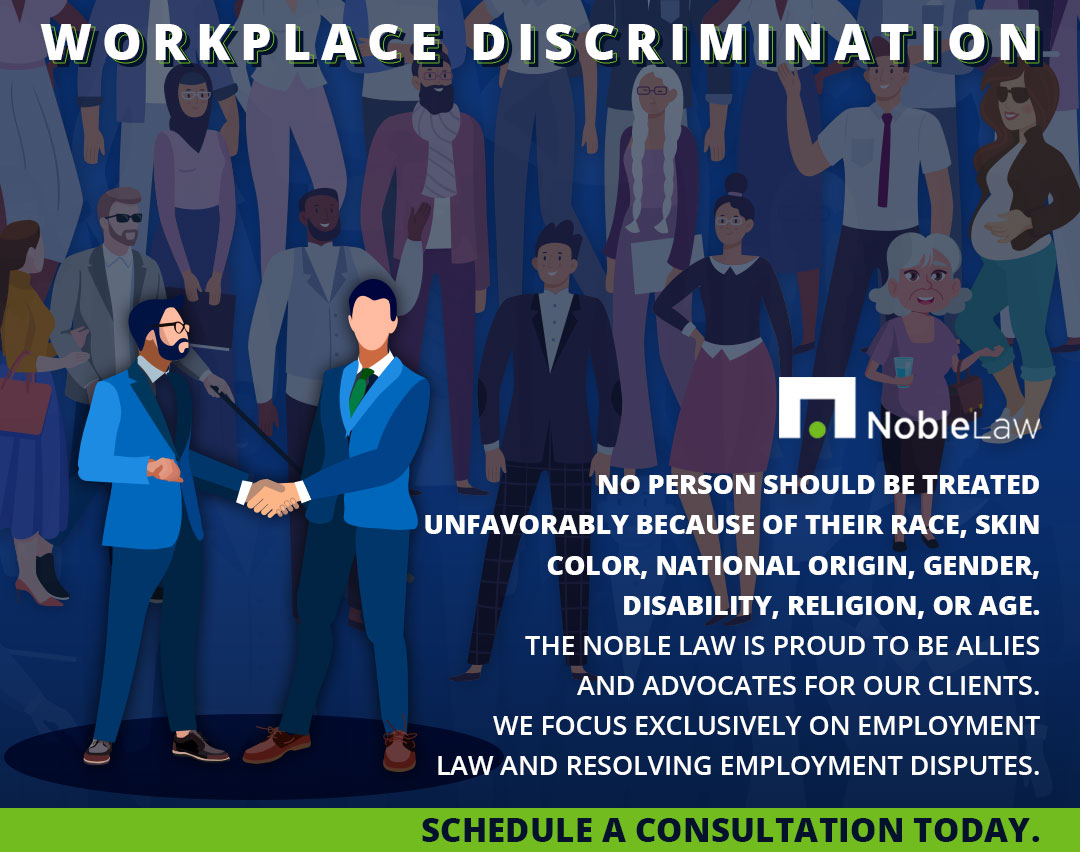Employees should always be judged on the quality of their work, not external on factors or characteristics such as skin color, religious beliefs, or sexual orientation. Unfortunately, there are employers or coworkers who make working conditions difficult or outright discriminate against people no matter their workplace performance.
The Noble Law is a woman-owned practice that focuses solely on employment law, and you can have confidence in our ability to resolve issues of workplace discrimination. Learn more about workplace discrimination and what to do about it from our Charlotte workplace discrimination lawyers.




What is Workplace Discrimination?
Workplace discrimination takes various forms. The bottom line is that a person is being treated unfairly due to a status based on personal characteristics, such as race or gender. Even if an employer discriminates against an employee unintentionally, that is still illegal.


Types of Workplace Discrimination
The most frequent types of workplace discrimination include:
- Age – Under the Age Discrimination in Employment Act of 1967, discriminating against workers over age 40 is illegal.
- Gender / Sex – This type of discrimination includes being paid less, terminated, demoted, passed over for promotions, or subjected to other unequal treatmentgender pay gaps and gender promotion, as well as protecting those with based on sex, gender, sexual orientation, or gender identity issues. This discrimination is prohibited under Title VII of the Civil Rights Act of 1964 (Title VII),.
- Race or Color – Title VII of the Civil Rights Act of 1964 prohibits employment discrimination on the basis of race or color. Discriminatory treatment on the basis of race or color might look like receiving less pay, being assigned worse job duties, being held to impossible or higher standards than your coworkers, not being promoted, or being terminated under false pretenses due to one’s race or skin color.
- National origin – Discrimination based on national origin is illegal under Title VII and is also prohibited by Title VII of the Civil Rights Act of 196involves treating applicants or employees less favorably because the individual or their family is from a particular country or part of the world, have an accent, or appear to be of a certain ethnic background (even if they are not)4.
- Disability – Under the Americans with Disabilities Act (ADA), discrimination on the basis of disability or needing an accommodation is not permitted against “certain” people with disabilities who can perform their essential job functions (with or without an accommodation). The Family Leave and Medical Act (FMLA) prevents discrimination for or retaliation against employees who qualify for FMLA leave from taking time off to tend tofor personal and family serious medical needs.
- Pregnancy – As Pregnant workers cannot be treated worse on the basis of their pregnancy, related conditions, or need for accommodations. is not a permanent condition, eEmployers cannot treat pregnant workers differently than workers must deal with it as they would any with other type of non-permanent illnesses or conditions. Failure to do so constitutes discrimination.
- Age – Under the Age Discrimination in Employment Act of 1967, discriminating against workers over the age of 40 is illegal.
- Religion – Discrimination based on religion is also prohibited by Title VII of the Civil Rights Act of 1964. With limited exceptions, individuals who practice a certain religion—or no religion at all—cannot be punished or treated poorly because of their religious beliefs.
These types of discrimination violate federal and state employment laws.
Recognizing Workplace Discrimination
Some incidences of workplace discrimination are obvious. Others are more subtle and may not be recognized as readily as discriminatory. For instance, if there is not much diversity on the work team, it is likely that discrimination is going on, even if unconsciously.
Common signs and manifestations of workplace discrimination include:
- Unfair hiring practices;.
- Salary and promotion disparities;.
- Off-color jokes or comments about protected characteristics are that are either directed at an employee or cause stress to the employee;.
- Denying employee’s religious leave;.
- Refusing to provide a reasonable accommodation to an employee or terminating them because they need an accommodation;
- Assigning job duties based on gender;.
- Assigning non-work duties based on gender, such as asking female employees to fetch coffee, or on race, such as asking employees of color to spearhead diversity, equity, and inclusion education efforts.
Real-world example of workplace discrimination
In 2022, the Ford Motor Company agreed to pay $115,000 to settle an EEOC pregnancy discrimination case. The company violated federal law when it refused to hire an applicant at its Illinois stamping plant because she was pregnant. The woman had passed a background check, physical, and drug test.
While Ford’s doctor cleared her to work, Ford did not schedule an initial workday. She called Ford regularly asking for updates as to when she would start working and was given various answers. Eventually, she was told Ford was no longer hiring.


Areas of Practice
At The Noble Law, our workplace discrimination practice includes sexual harassment and pregnancy discriminationharassment on the basis of other protected characteristics. If you have suffered a sexual assault or any other form of harassment in the workplace, we want to help. Other key practice areas include:
- Gender pay gap
- Disability rights
- Wage theft
- Workplace assault
- Whistleblower retaliation
For those in North Carolina and South Carolina, The Noble Law is ready to advocate for your rights. We believe you, and we will work hard to get you the justice you deserve.

Legal Protections and Employee Rights
Federal anti-discrimination laws pertain to all North Carolina employers with 15 or more employees. When it comes to equal pay between men and women, no employers are exempt. Age discrimination applies only to employers with 20 or more employees.
North Carolina recognizes protected categories not covered by federal law. These include HIV status, sickle cell trait, and the lawful use of legal products while not on the job.
Our attorneys understand the gravity of these laws, and we fight fiercely for our clients in the name of those rights. We will also determine whether you fall into one of the protected federal or state classes, based on employer size and other factors.
What to Do If You Suspect You Are a Victim of Workplace Discrimination
If you suspect you are being discriminated against on the job, documenting the situation is crucial. Here is what to do:
- If your employer has an anti-discrimination policy, anti-harassment policy, and/or anti-retaliation policy, review it carefully. Such policies are usually found in the employee handbook. If you do not have a copy, obtain one.
- Take notes after any suspected discrimination incident. Write down what was said or done, who said or did it, and the names of any witnesses. Record the date and approximate time of the incident.
- If you receive any emails that you feel demonstrate discriminatory treatmented against you, save them.
- If someone leaves or posts an item you consider discriminatory or harassing, take a photo of it for your attorney’s later reference. It is important to take the photo of the item in the place where it was found. An offensive item left where co-workers can see it is even more egregious than one left where only you are likely to find it.
- If the discrimination involves racial or sexual harassment, report it to your supervisor and/or Human Resources immediately.
After documenting such evidence, contact a Charlotte workplace discrimination lawyer for assistance.
Why Choose Us as Your Charlotte Workplace Discrimination Lawyer
When it comes to choosing a Charlotte workplace discrimination attorney, you want a law firm with a long history of handling workplace discrimination cases who will treat you and your case with the individual care and attention deserved. The Noble Law fits those criteria, and our track record is second to none.
Contact a Charlotte Workplace Discrimination Lawyer
If you believe you are a victim of workplace discrimination, you need the services of an experienced employment law attorney at The Noble Law. Schedule a free, no-obligation consultation today. The Noble Law is woman –owned. We share your goals: to affirm your dignity and obtain the compensation you deserve.

Learn More
The Noble Law is committed to educating our communities in North Carolina about employment law. We believe that one of the first steps to a more equitable workplace is for employees to understand their rights. And we also believe that part of our job as employment lawyers is to share what we know with others. Explore our resources, including more employment law videos, and keep up with our employment law firm news by following Noble Notes.
Along with representing clients in the area of workplace discrimination, we also provide legal counsel to clients with claims of workplace harassment, executive compensation disputes, retaliation and whistleblower, and pay, overtime, and leave cases. Learn more about our law firm on our Practice Area page and if you’re interested in speaking with one of our employment lawyers, contact us today.


